Hearts of Oak Podcast
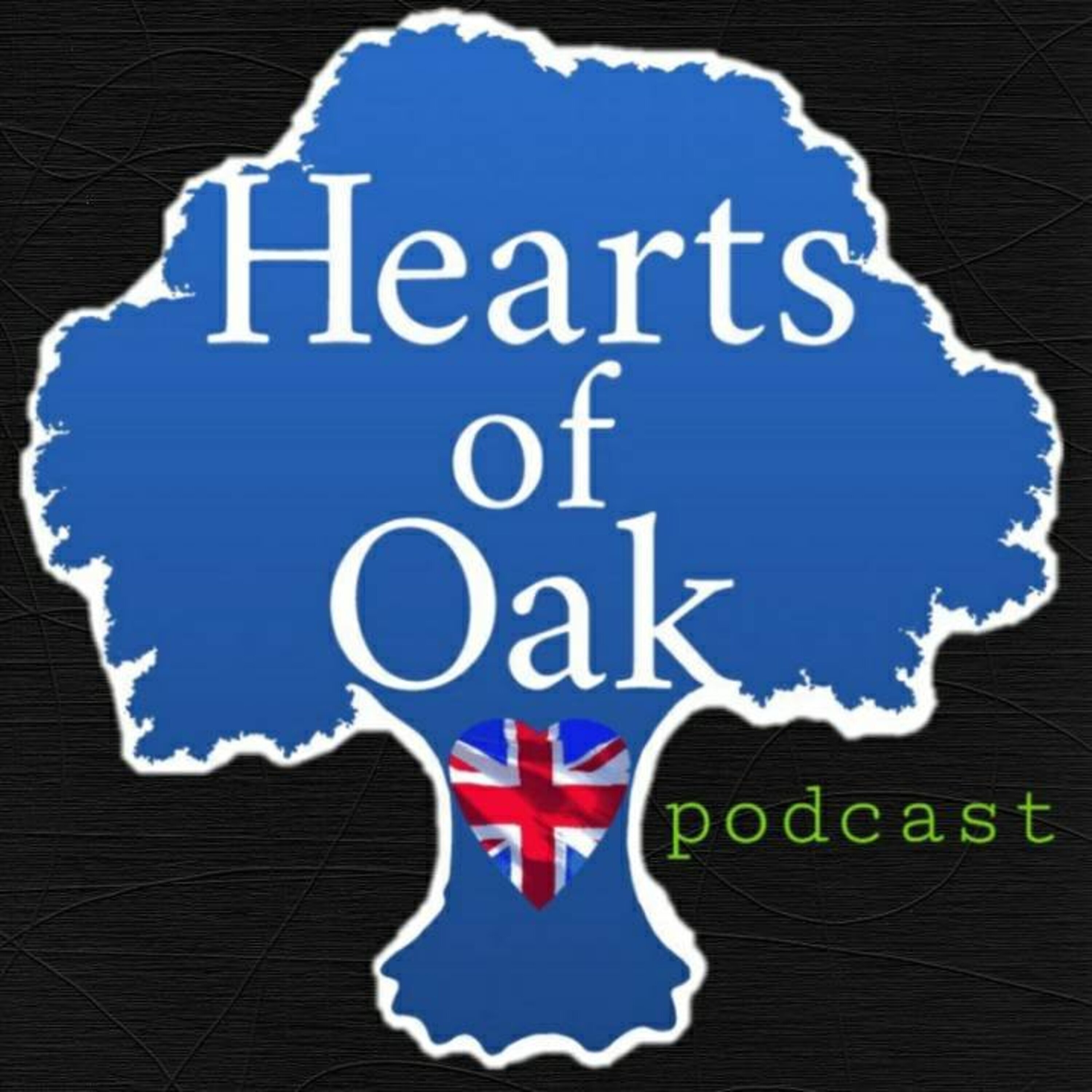
GUEST INTERVIEWS - Every Monday and Thursday - WEEKLY NEWS REVIEW - Every Weekend - Hearts of Oak is a Free Speech Alliance that bridges the transatlantic and cultural gap between the UK and the USA. Despite the this gap, values such as common sense, conviction and courage can transcend borders. For all our social media , video , livestream platforms and more https://heartsofoak.org/connect/
GUEST INTERVIEWS - Every Monday and Thursday - WEEKLY NEWS REVIEW - Every Weekend - Hearts of Oak is a Free Speech Alliance that bridges the transatlantic and cultural gap between the UK and the USA. Despite the this gap, values such as common sense, conviction and courage can transcend borders. For all our social media , video , livestream platforms and more https://heartsofoak.org/connect/
Episodes
Episodes
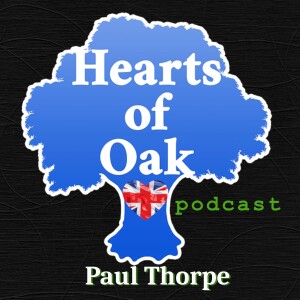


Tuesday Jan 21, 2025
Tuesday Jan 21, 2025
In this episode, we dive into the life and insights of Paul Thorpe, a former professional watch dealer with an eclectic background in sports and business. Thorpe shares his journey from the football fields of Fulham Football Club to the world of luxury watches, highlighting how a chance encounter at Harrods shaped his career. The discussion then pivots to Thorpe's political views, particularly his support for Tommy Robinson, whom he describes as misunderstood by mainstream media but personally known to him as a kind and educated individual. Thorpe delves into the broader implications of UK politics, discussing recent protests as peaceful gatherings of diverse groups advocating for civil liberties and free speech.
He critiques the disconnect between political parties and the public, expressing disappointment in some political figures while advocating for unity and grassroots movements like the Pledge. Thorpe also touches on the influence of figures like Elon Musk in reshaping narratives and emphasizes the importance of platforms like YouTube for providing a voice to those often sidelined by traditional media. This episode encapsulates Thorpe's call for active engagement in democracy, urging listeners to stand against perceived state overreach while fostering a sense of community and shared purpose.
Connect with Paul Thorpe:
𝕏 https://x.com/ThorpeWatch
YouTube https://www.youtube.com/channel/
Connect with Hearts of Oak...𝕏 x.com/HeartsofOakUKWEBSITE heartsofoak.org/PODCASTS heartsofoak.podbean.com/SOCIAL MEDIA heartsofoak.org/connect/SHOP heartsofoak.org/shop/
*Special thanks to Bosch Fawstin for recording our intro/outro on this podcast.
Check out his art theboschfawstinstore.blogspot.com and follow him on 𝕏 x.com/TheBoschFawstin
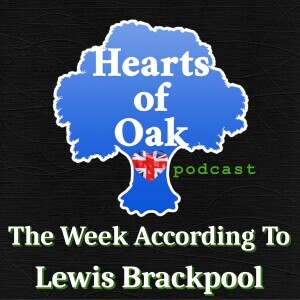


Monday Jan 20, 2025
The Week According To . . . Lewis Brackpool
Monday Jan 20, 2025
Monday Jan 20, 2025
Lewis Brackpool is back with us for our weekend look through some of the news stories, articles and social media posts we just couldn't ignore! This week we dive into the week's most pressing political and social issues. Join Lewis Brackpool as we dissect the upcoming U.S. Inauguration, analyze UK-U.S. relations, tackle the grooming gang scandal, and discuss the critical need for justice reform. This episode promises a no-holds-barred examination of the events shaping our world. Don't miss out on this compelling discussion – tune in now for insights that challenge, enlighten, and call for action.
Connect with Lewis...X/TWITTER x.com/Lewis_Brackpool PODCAST open.spotify.com/show/1ObKegtoG8OH5fIFP3hjUx?si=f3f470c139b84167SUBSTACK lewisbrackpool.substack.com/
Connect with Hearts of Oak...𝕏 x.com/HeartsofOakUKWEBSITE heartsofoak.org/PODCASTS heartsofoak.podbean.com/SOCIAL MEDIA heartsofoak.org/connect/SHOP heartsofoak.org/shop/
*Special thanks to Bosch Fawstin for recording our intro/outro on this podcast.
Check out his art theboschfawstinstore.blogspot.com and follow him on 𝕏 x.com/TheBoschFawstin
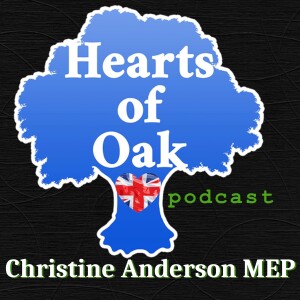


Thursday Jan 16, 2025
Thursday Jan 16, 2025
In a compelling episode on the Hearts of Oak podcast, listeners are treated to an in-depth conversation with Christine Anderson, a prominent member of the European Parliament representing the Alternative für Deutschland (AfD). Anderson shares her unexpected path from being a stay-at-home mother to becoming a vocal critic of mainstream political narratives, highlighting her insights on the socio-political dynamics reshaping Europe.
Unique Perspective: Hear firsthand from Christine Anderson about her transition from private life to the political arena.
Political Insight: Understand the challenges and goals of populist movements in contemporary European politics.
Cultural Commentary: Gain insights into the cultural divides within Germany and their political implications.
Current Events: Get an update on the AfD's role in the upcoming German elections and the evolving political landscape.
Interview recorded on 15.01.25
Connect with Christine Anderson MEP...𝕏 x.com/AndersonAfDMdEPWebsite: https://t.co/XxcpAImCZF
Connect with Hearts of Oak...𝕏 x.com/HeartsofOakUKWEBSITE heartsofoak.org/PODCASTS heartsofoak.podbean.com/SOCIAL MEDIA heartsofoak.org/connect/SHOP heartsofoak.org/shop/
*Special thanks to Bosch Fawstin for recording our intro/outro on this podcast.
Check out his art theboschfawstinstore.blogspot.com and follow him on 𝕏 x.com/TheBoschFawstin
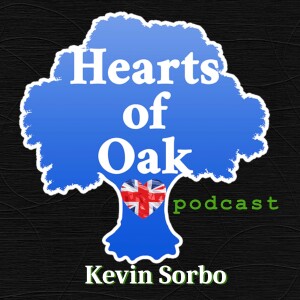


Monday Jan 13, 2025
Monday Jan 13, 2025
In this engaging podcast episode with Hearts of Oak, Kevin Sorbo dives into a variety of pressing social, political, and cultural topics. He begins by recounting his personal experiences with the devastating wildfires in California, linking them to broader issues of state mismanagement and speculating on possible causes, including terrorism. Sorbo critiques California's political leadership, particularly Governor Gavin Newsom, attributing the state's challenges like crime and water resource management to liberal policies, which he believes are driving residents to more conservative states like Florida and Texas.
Connect with Kevin and Sorbo Films...X/TWITTER x.com/ksorbsWEBSITE sorbostudios.com/INSTAGRAM instagram.com/ksorbo
Connect with Hearts of Oak...𝕏 x.com/HeartsofOakUKWEBSITE heartsofoak.org/PODCASTS heartsofoak.podbean.com/SOCIAL MEDIA heartsofoak.org/connect/SHOP heartsofoak.org/shop/
*Special thanks to Bosch Fawstin for recording our intro/outro on this podcast.
Check out his art theboschfawstinstore.blogspot.com and follow him on 𝕏 x.com/TheBoschFawstin
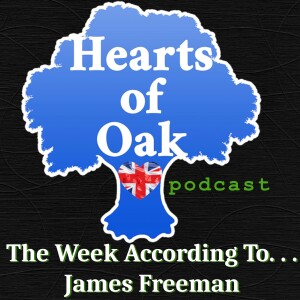


Saturday Jan 11, 2025
The Week According To. . . James Freeman
Saturday Jan 11, 2025
Saturday Jan 11, 2025
Welcome to Hearts of Oak, where truth comes first. Today, we sit down with James Freeman from The Freeman Report to tackle the UK's grooming gang crisis, the political fallout, and the need for accountability. We'll also discuss how figures like Elon Musk are influencing political discourse and what this means for governance. Plus, we'll look at the state of journalism, child protection failures, and international political shifts. Get ready for a deep dive into systemic issues demanding our attention. Let's begin
Connect with James𝕏 https://x.com/james_freeman_YouTube: https://www.youtube.com/@TheFreemanReport?si=Xuuy59BWNZsXncvJ
Connect with Hearts of Oak...𝕏 x.com/HeartsofOakUKWEBSITE heartsofoak.org/PODCASTS heartsofoak.podbean.com/SOCIAL MEDIA heartsofoak.org/connect/SHOP heartsofoak.org/shop/
*Special thanks to Bosch Fawstin for recording our intro/outro on this podcast.
Check out his art theboschfawstinstore.blogspot.com and follow him on 𝕏 x.com/TheBoschFawstin
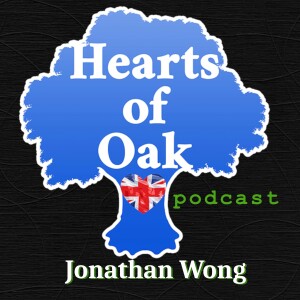


Thursday Jan 09, 2025
Thursday Jan 09, 2025
Welcome to Hearts of Oak. Today, we're with Jon Wong from Vox Populi Media, discussing his recent visit to Tommy Robinson in prison and the broader implications for society. We'll tackle issues like mass migration, grooming gangs, and the state of free speech, while exploring the political landscape and systemic injustices. Join us for a critical look at where we stand and what we need to change. Stay tuned.Connect with Jonathan...
Website: VoxPopuli Media - The Voice of the People𝕏 Jonathan Wong (@WGthink) / X
Connect with Hearts of Oak...𝕏 x.com/HeartsofOakUKWEBSITE heartsofoak.org/PODCASTS heartsofoak.podbean.com/SOCIAL MEDIA heartsofoak.org/connect/SHOP heartsofoak.org/shop/
*Special thanks to Bosch Fawstin for recording our intro/outro on this podcast.
Check out his art theboschfawstinstore.blogspot.com and follow him on 𝕏 x.com/TheBoschFawstin
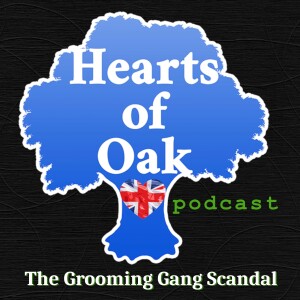


Wednesday Jan 08, 2025
Wednesday Jan 08, 2025
Join us for a powerful episode of our podcast as we confront the harrowing reality of grooming gangs in the UK. We revisit the 2012 revelations by The Times about the Rotherham scandal, where over 1,500 children were victims of sexual abuse, a grim reminder of a much larger, systemic issue spanning across 40+ towns. Through the story of Elizabeth Harper, we explore the personal horrors endured by victims and the institutional neglect that has allowed these abuses to continue unchecked.
This episode features deep dives into the courageous work of groups like Risky Business, who've been at the forefront of supporting survivors. We'll share raw interviews with survivors and their families, shedding light on the intimidation and silence that has often surrounded these cases. We'll discuss how political correctness has potentially hindered law enforcement and justice, examining the cultural and societal underpinnings that have fueled these crimes.
From the Rotherham Inquiry to the Jay Report, we'll analyze how these investigations have highlighted the failures of authorities and the urgent need for reform. We'll also tackle the legal battles survivors face, exemplified by Liz's ongoing fight for justice, which underscores the broader challenges in our legal system.
This isn't just a recount of past horrors; it's a call to action. We'll discuss the need for systemic change, the role of public figures in maintaining this conversation, and the importance of ensuring reparations and justice for victims. Tune in to understand how we can all contribute to reshaping a society where such atrocities are not just condemned but actively prevented. Don't miss this crucial conversation on safeguarding our youth and demanding accountability.
LIVE recorded 06.01.25
Connect with Hearts of Oak...𝕏 x.com/HeartsofOakUKWEBSITE heartsofoak.org/PODCASTS heartsofoak.podbean.com/SOCIAL MEDIA heartsofoak.org/connect/SHOP heartsofoak.org/shop/
*Special thanks to Bosch Fawstin for recording our intro/outro on this podcast.
Check out his art theboschfawstinstore.blogspot.com and follow him on 𝕏 x.com/TheBoschFawstin
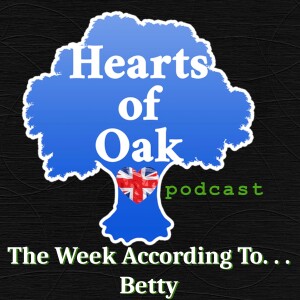


Saturday Jan 04, 2025
The Week According To . . . Betty
Saturday Jan 04, 2025
Saturday Jan 04, 2025
Welcome to Hearts of Oak, where we tackle the UK's grooming gang scandals head-on. Today, we discuss Joey Barton's passionate call for accountability and how Elon Musk's involvement has rekindled public outcry. We'll explore the media's role, the complexities of cultural discussions, and the urgent need for political action. Join us as we push for change to protect our most vulnerable - our children. Let's dive in.Chapters0:27 Welcome Back to Heart to Vogue24:49 The Impact of Elon Musk's Tweets42:28 Conversations on Islam and Society49:13 Closing Thoughts and Future Conversations
Connect with Betty on X/Twitter @CaliforniaFrizz x.com/CaliforniaFrizz
Connect with Hearts of Oak...𝕏 x.com/HeartsofOakUKWEBSITE heartsofoak.org/PODCASTS heartsofoak.podbean.com/SOCIAL MEDIA heartsofoak.org/connect/SHOP heartsofoak.org/shop/
*Special thanks to Bosch Fawstin for recording our intro/outro on this podcast.
Check out his art theboschfawstinstore.blogspot.com and follow him on 𝕏 x.com/TheBoschFawstin

